Cross-Cultural Management Report: Challenges in HG's Ugandan Project
VerifiedAdded on 2020/07/22
|7
|1655
|56
Report
AI Summary
This report analyzes the cross-cultural management challenges faced by HG, a company operating in Uganda. The report identifies issues such as employee dissatisfaction, difficulties in dealing with local authorities, and the impact of tribal rituals on the company's operations. It contrasts the leadership styles of Green and Martin, highlighting the importance of cultural sensitivity and effective communication in managing international projects. The report emphasizes the significance of understanding cultural differences, particularly in relation to communication and negotiation, and how these factors influence the success of business ventures. The analysis concludes that Martin's approach, characterized by respect for local culture, is crucial for the project's success, while Green's ethnocentric perspective poses significant challenges. The report also explores the role of communication and negotiation in cross-cultural settings, offering insights into effective strategies for managing a diverse workforce and achieving business objectives.
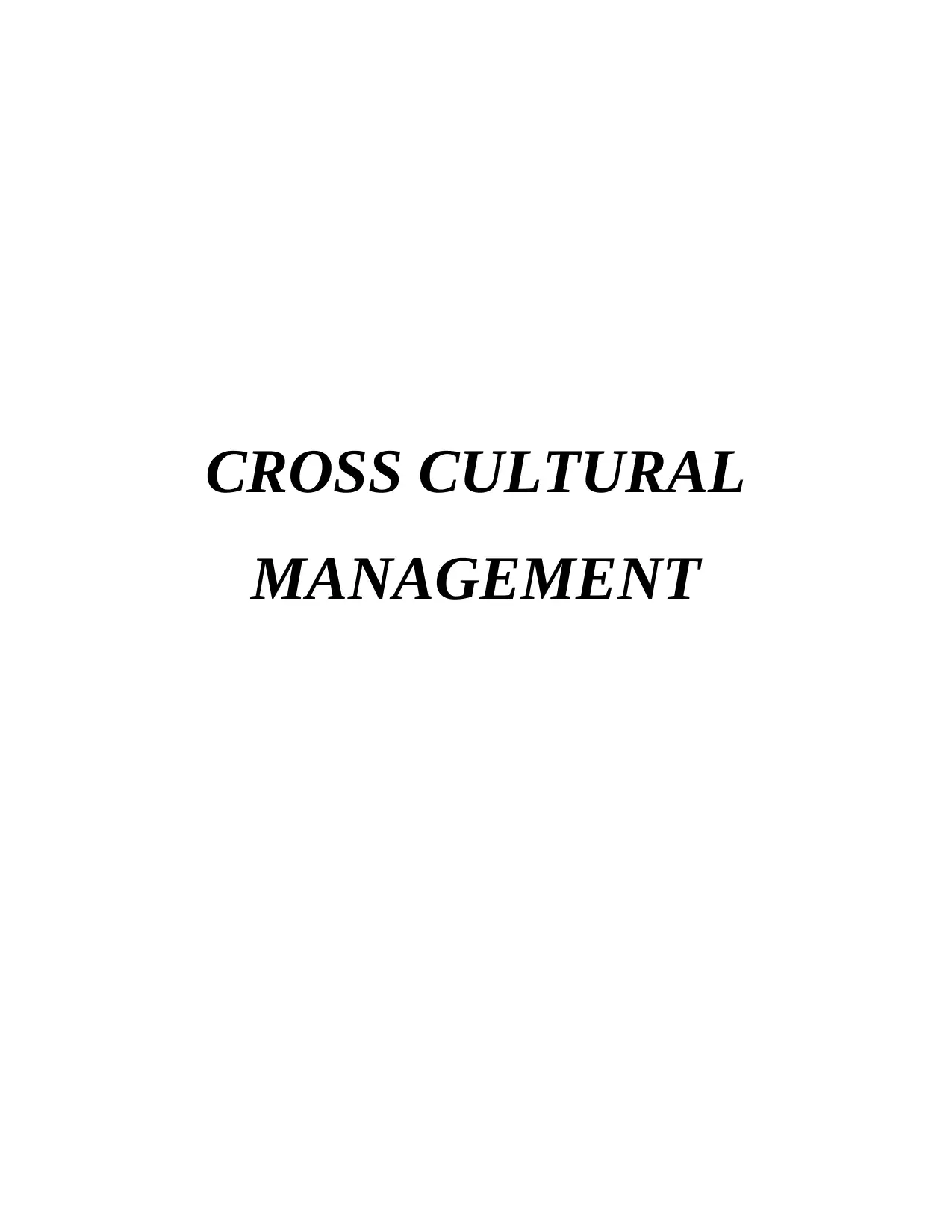
CROSS CULTURAL
MANAGEMENT
MANAGEMENT
Paraphrase This Document
Need a fresh take? Get an instant paraphrase of this document with our AI Paraphraser
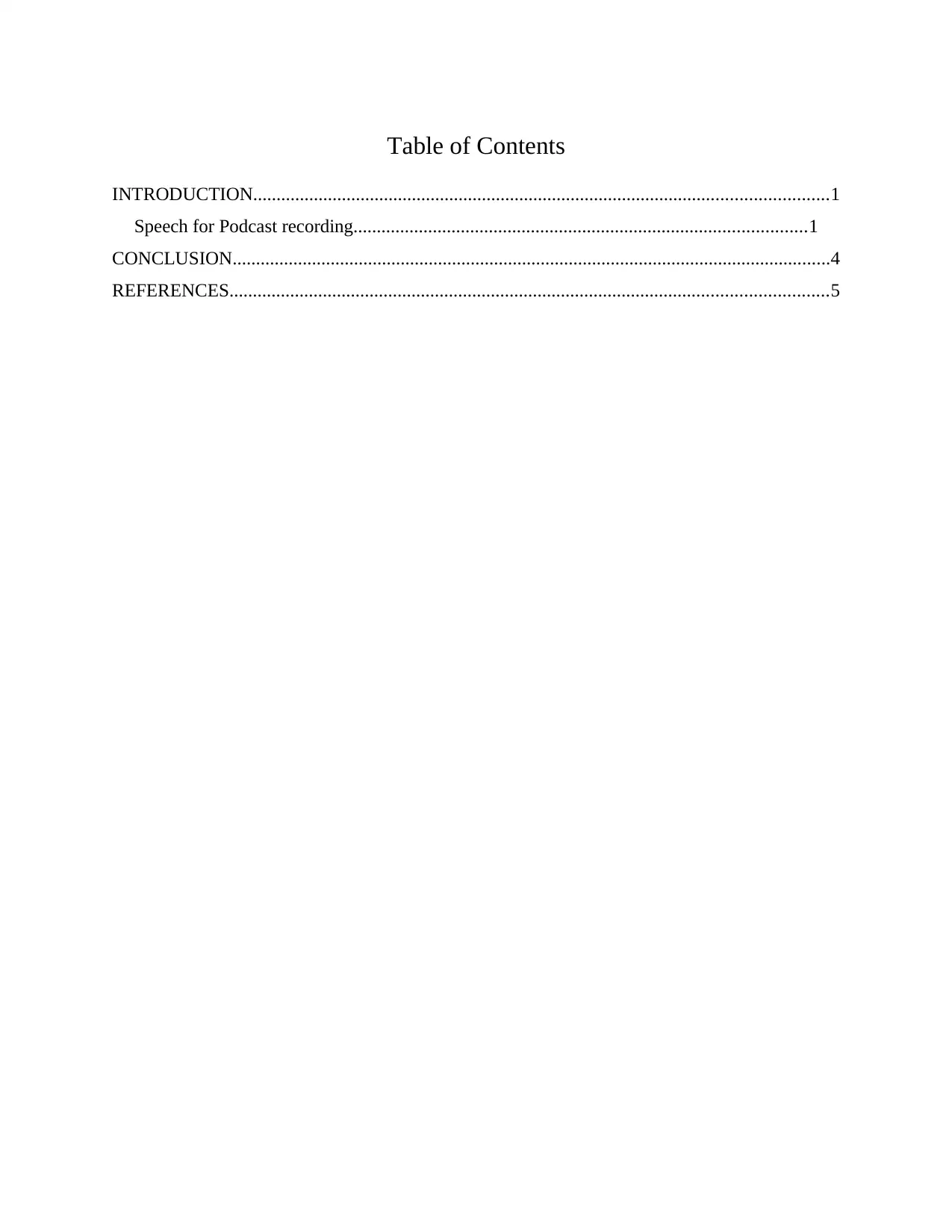
Table of Contents
INTRODUCTION...........................................................................................................................1
Speech for Podcast recording.................................................................................................1
CONCLUSION................................................................................................................................4
REFERENCES................................................................................................................................5
INTRODUCTION...........................................................................................................................1
Speech for Podcast recording.................................................................................................1
CONCLUSION................................................................................................................................4
REFERENCES................................................................................................................................5
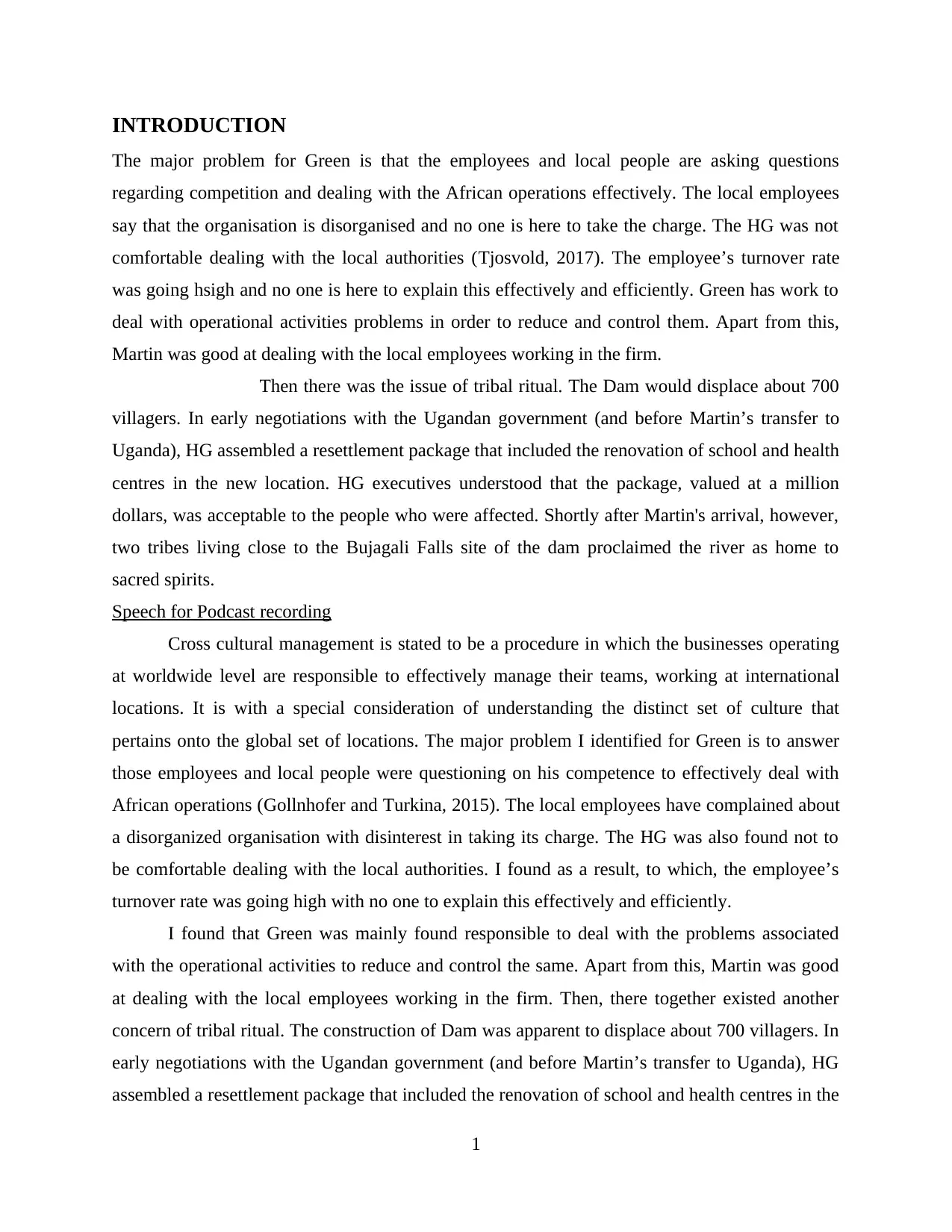
INTRODUCTION
The major problem for Green is that the employees and local people are asking questions
regarding competition and dealing with the African operations effectively. The local employees
say that the organisation is disorganised and no one is here to take the charge. The HG was not
comfortable dealing with the local authorities (Tjosvold, 2017). The employee’s turnover rate
was going hsigh and no one is here to explain this effectively and efficiently. Green has work to
deal with operational activities problems in order to reduce and control them. Apart from this,
Martin was good at dealing with the local employees working in the firm.
Then there was the issue of tribal ritual. The Dam would displace about 700
villagers. In early negotiations with the Ugandan government (and before Martin’s transfer to
Uganda), HG assembled a resettlement package that included the renovation of school and health
centres in the new location. HG executives understood that the package, valued at a million
dollars, was acceptable to the people who were affected. Shortly after Martin's arrival, however,
two tribes living close to the Bujagali Falls site of the dam proclaimed the river as home to
sacred spirits.
Speech for Podcast recording
Cross cultural management is stated to be a procedure in which the businesses operating
at worldwide level are responsible to effectively manage their teams, working at international
locations. It is with a special consideration of understanding the distinct set of culture that
pertains onto the global set of locations. The major problem I identified for Green is to answer
those employees and local people were questioning on his competence to effectively deal with
African operations (Gollnhofer and Turkina, 2015). The local employees have complained about
a disorganized organisation with disinterest in taking its charge. The HG was also found not to
be comfortable dealing with the local authorities. I found as a result, to which, the employee’s
turnover rate was going high with no one to explain this effectively and efficiently.
I found that Green was mainly found responsible to deal with the problems associated
with the operational activities to reduce and control the same. Apart from this, Martin was good
at dealing with the local employees working in the firm. Then, there together existed another
concern of tribal ritual. The construction of Dam was apparent to displace about 700 villagers. In
early negotiations with the Ugandan government (and before Martin’s transfer to Uganda), HG
assembled a resettlement package that included the renovation of school and health centres in the
1
The major problem for Green is that the employees and local people are asking questions
regarding competition and dealing with the African operations effectively. The local employees
say that the organisation is disorganised and no one is here to take the charge. The HG was not
comfortable dealing with the local authorities (Tjosvold, 2017). The employee’s turnover rate
was going hsigh and no one is here to explain this effectively and efficiently. Green has work to
deal with operational activities problems in order to reduce and control them. Apart from this,
Martin was good at dealing with the local employees working in the firm.
Then there was the issue of tribal ritual. The Dam would displace about 700
villagers. In early negotiations with the Ugandan government (and before Martin’s transfer to
Uganda), HG assembled a resettlement package that included the renovation of school and health
centres in the new location. HG executives understood that the package, valued at a million
dollars, was acceptable to the people who were affected. Shortly after Martin's arrival, however,
two tribes living close to the Bujagali Falls site of the dam proclaimed the river as home to
sacred spirits.
Speech for Podcast recording
Cross cultural management is stated to be a procedure in which the businesses operating
at worldwide level are responsible to effectively manage their teams, working at international
locations. It is with a special consideration of understanding the distinct set of culture that
pertains onto the global set of locations. The major problem I identified for Green is to answer
those employees and local people were questioning on his competence to effectively deal with
African operations (Gollnhofer and Turkina, 2015). The local employees have complained about
a disorganized organisation with disinterest in taking its charge. The HG was also found not to
be comfortable dealing with the local authorities. I found as a result, to which, the employee’s
turnover rate was going high with no one to explain this effectively and efficiently.
I found that Green was mainly found responsible to deal with the problems associated
with the operational activities to reduce and control the same. Apart from this, Martin was good
at dealing with the local employees working in the firm. Then, there together existed another
concern of tribal ritual. The construction of Dam was apparent to displace about 700 villagers. In
early negotiations with the Ugandan government (and before Martin’s transfer to Uganda), HG
assembled a resettlement package that included the renovation of school and health centres in the
1
⊘ This is a preview!⊘
Do you want full access?
Subscribe today to unlock all pages.

Trusted by 1+ million students worldwide
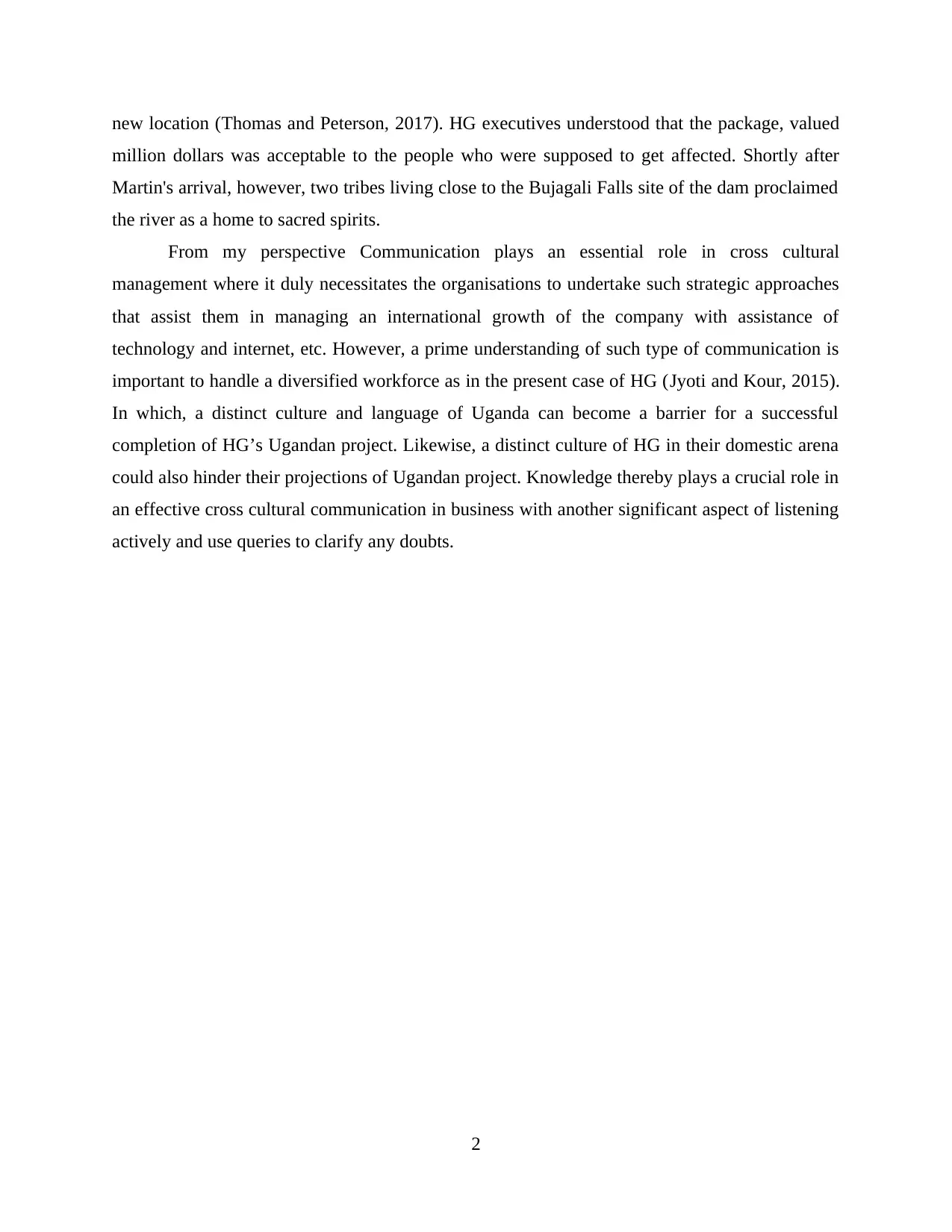
new location (Thomas and Peterson, 2017). HG executives understood that the package, valued
million dollars was acceptable to the people who were supposed to get affected. Shortly after
Martin's arrival, however, two tribes living close to the Bujagali Falls site of the dam proclaimed
the river as a home to sacred spirits.
From my perspective Communication plays an essential role in cross cultural
management where it duly necessitates the organisations to undertake such strategic approaches
that assist them in managing an international growth of the company with assistance of
technology and internet, etc. However, a prime understanding of such type of communication is
important to handle a diversified workforce as in the present case of HG (Jyoti and Kour, 2015).
In which, a distinct culture and language of Uganda can become a barrier for a successful
completion of HG’s Ugandan project. Likewise, a distinct culture of HG in their domestic arena
could also hinder their projections of Ugandan project. Knowledge thereby plays a crucial role in
an effective cross cultural communication in business with another significant aspect of listening
actively and use queries to clarify any doubts.
2
million dollars was acceptable to the people who were supposed to get affected. Shortly after
Martin's arrival, however, two tribes living close to the Bujagali Falls site of the dam proclaimed
the river as a home to sacred spirits.
From my perspective Communication plays an essential role in cross cultural
management where it duly necessitates the organisations to undertake such strategic approaches
that assist them in managing an international growth of the company with assistance of
technology and internet, etc. However, a prime understanding of such type of communication is
important to handle a diversified workforce as in the present case of HG (Jyoti and Kour, 2015).
In which, a distinct culture and language of Uganda can become a barrier for a successful
completion of HG’s Ugandan project. Likewise, a distinct culture of HG in their domestic arena
could also hinder their projections of Ugandan project. Knowledge thereby plays a crucial role in
an effective cross cultural communication in business with another significant aspect of listening
actively and use queries to clarify any doubts.
2
Paraphrase This Document
Need a fresh take? Get an instant paraphrase of this document with our AI Paraphraser
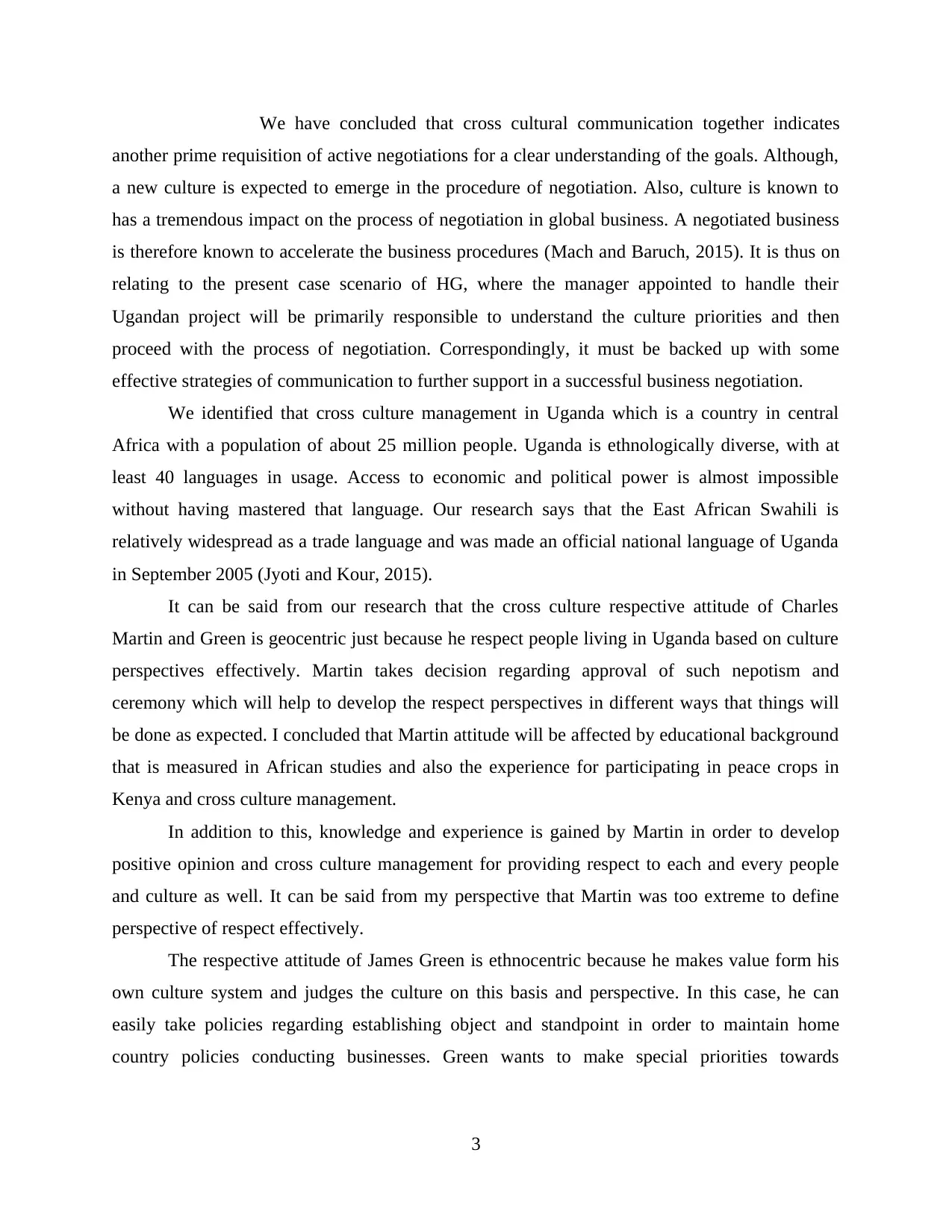
We have concluded that cross cultural communication together indicates
another prime requisition of active negotiations for a clear understanding of the goals. Although,
a new culture is expected to emerge in the procedure of negotiation. Also, culture is known to
has a tremendous impact on the process of negotiation in global business. A negotiated business
is therefore known to accelerate the business procedures (Mach and Baruch, 2015). It is thus on
relating to the present case scenario of HG, where the manager appointed to handle their
Ugandan project will be primarily responsible to understand the culture priorities and then
proceed with the process of negotiation. Correspondingly, it must be backed up with some
effective strategies of communication to further support in a successful business negotiation.
We identified that cross culture management in Uganda which is a country in central
Africa with a population of about 25 million people. Uganda is ethnologically diverse, with at
least 40 languages in usage. Access to economic and political power is almost impossible
without having mastered that language. Our research says that the East African Swahili is
relatively widespread as a trade language and was made an official national language of Uganda
in September 2005 (Jyoti and Kour, 2015).
It can be said from our research that the cross culture respective attitude of Charles
Martin and Green is geocentric just because he respect people living in Uganda based on culture
perspectives effectively. Martin takes decision regarding approval of such nepotism and
ceremony which will help to develop the respect perspectives in different ways that things will
be done as expected. I concluded that Martin attitude will be affected by educational background
that is measured in African studies and also the experience for participating in peace crops in
Kenya and cross culture management.
In addition to this, knowledge and experience is gained by Martin in order to develop
positive opinion and cross culture management for providing respect to each and every people
and culture as well. It can be said from my perspective that Martin was too extreme to define
perspective of respect effectively.
The respective attitude of James Green is ethnocentric because he makes value form his
own culture system and judges the culture on this basis and perspective. In this case, he can
easily take policies regarding establishing object and standpoint in order to maintain home
country policies conducting businesses. Green wants to make special priorities towards
3
another prime requisition of active negotiations for a clear understanding of the goals. Although,
a new culture is expected to emerge in the procedure of negotiation. Also, culture is known to
has a tremendous impact on the process of negotiation in global business. A negotiated business
is therefore known to accelerate the business procedures (Mach and Baruch, 2015). It is thus on
relating to the present case scenario of HG, where the manager appointed to handle their
Ugandan project will be primarily responsible to understand the culture priorities and then
proceed with the process of negotiation. Correspondingly, it must be backed up with some
effective strategies of communication to further support in a successful business negotiation.
We identified that cross culture management in Uganda which is a country in central
Africa with a population of about 25 million people. Uganda is ethnologically diverse, with at
least 40 languages in usage. Access to economic and political power is almost impossible
without having mastered that language. Our research says that the East African Swahili is
relatively widespread as a trade language and was made an official national language of Uganda
in September 2005 (Jyoti and Kour, 2015).
It can be said from our research that the cross culture respective attitude of Charles
Martin and Green is geocentric just because he respect people living in Uganda based on culture
perspectives effectively. Martin takes decision regarding approval of such nepotism and
ceremony which will help to develop the respect perspectives in different ways that things will
be done as expected. I concluded that Martin attitude will be affected by educational background
that is measured in African studies and also the experience for participating in peace crops in
Kenya and cross culture management.
In addition to this, knowledge and experience is gained by Martin in order to develop
positive opinion and cross culture management for providing respect to each and every people
and culture as well. It can be said from my perspective that Martin was too extreme to define
perspective of respect effectively.
The respective attitude of James Green is ethnocentric because he makes value form his
own culture system and judges the culture on this basis and perspective. In this case, he can
easily take policies regarding establishing object and standpoint in order to maintain home
country policies conducting businesses. Green wants to make special priorities towards
3
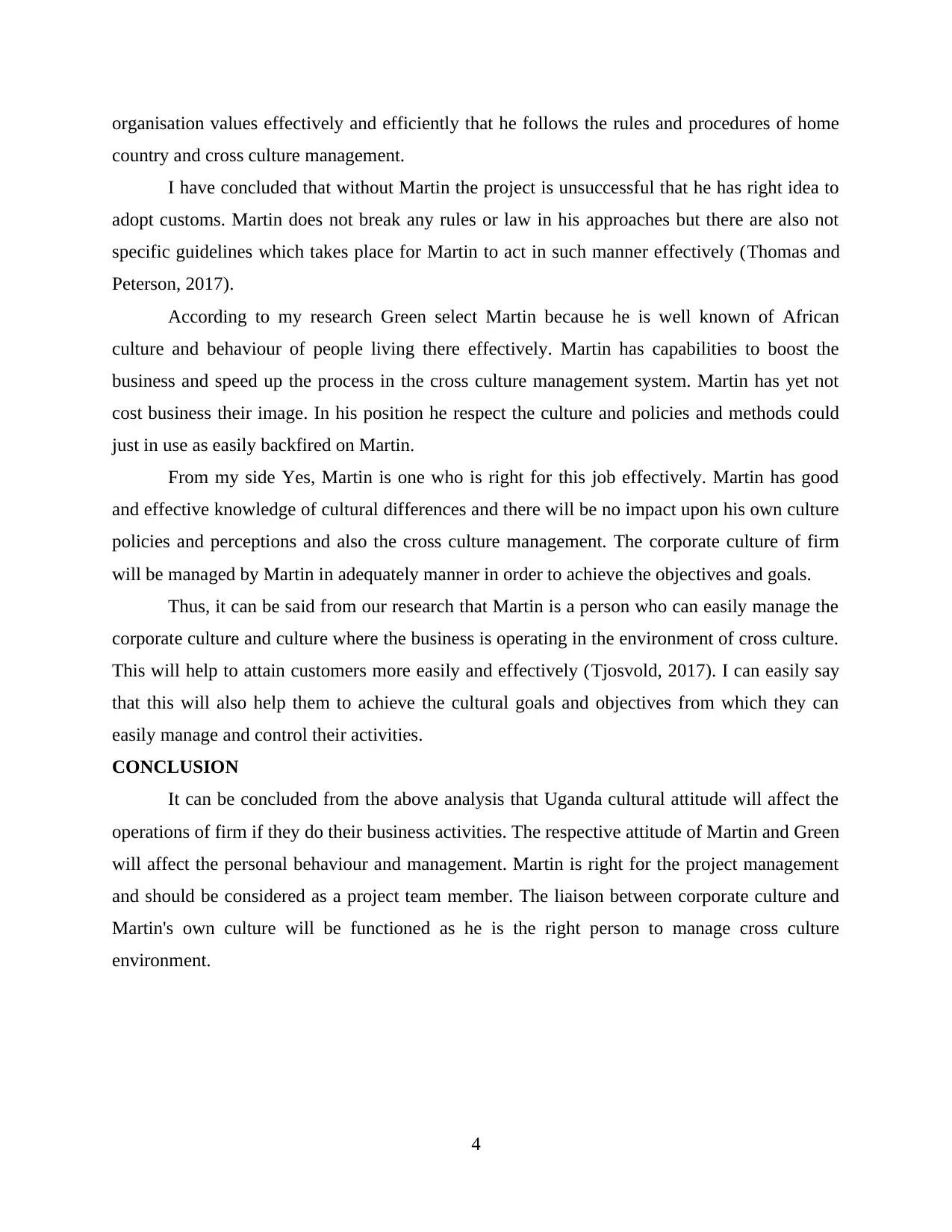
organisation values effectively and efficiently that he follows the rules and procedures of home
country and cross culture management.
I have concluded that without Martin the project is unsuccessful that he has right idea to
adopt customs. Martin does not break any rules or law in his approaches but there are also not
specific guidelines which takes place for Martin to act in such manner effectively (Thomas and
Peterson, 2017).
According to my research Green select Martin because he is well known of African
culture and behaviour of people living there effectively. Martin has capabilities to boost the
business and speed up the process in the cross culture management system. Martin has yet not
cost business their image. In his position he respect the culture and policies and methods could
just in use as easily backfired on Martin.
From my side Yes, Martin is one who is right for this job effectively. Martin has good
and effective knowledge of cultural differences and there will be no impact upon his own culture
policies and perceptions and also the cross culture management. The corporate culture of firm
will be managed by Martin in adequately manner in order to achieve the objectives and goals.
Thus, it can be said from our research that Martin is a person who can easily manage the
corporate culture and culture where the business is operating in the environment of cross culture.
This will help to attain customers more easily and effectively (Tjosvold, 2017). I can easily say
that this will also help them to achieve the cultural goals and objectives from which they can
easily manage and control their activities.
CONCLUSION
It can be concluded from the above analysis that Uganda cultural attitude will affect the
operations of firm if they do their business activities. The respective attitude of Martin and Green
will affect the personal behaviour and management. Martin is right for the project management
and should be considered as a project team member. The liaison between corporate culture and
Martin's own culture will be functioned as he is the right person to manage cross culture
environment.
4
country and cross culture management.
I have concluded that without Martin the project is unsuccessful that he has right idea to
adopt customs. Martin does not break any rules or law in his approaches but there are also not
specific guidelines which takes place for Martin to act in such manner effectively (Thomas and
Peterson, 2017).
According to my research Green select Martin because he is well known of African
culture and behaviour of people living there effectively. Martin has capabilities to boost the
business and speed up the process in the cross culture management system. Martin has yet not
cost business their image. In his position he respect the culture and policies and methods could
just in use as easily backfired on Martin.
From my side Yes, Martin is one who is right for this job effectively. Martin has good
and effective knowledge of cultural differences and there will be no impact upon his own culture
policies and perceptions and also the cross culture management. The corporate culture of firm
will be managed by Martin in adequately manner in order to achieve the objectives and goals.
Thus, it can be said from our research that Martin is a person who can easily manage the
corporate culture and culture where the business is operating in the environment of cross culture.
This will help to attain customers more easily and effectively (Tjosvold, 2017). I can easily say
that this will also help them to achieve the cultural goals and objectives from which they can
easily manage and control their activities.
CONCLUSION
It can be concluded from the above analysis that Uganda cultural attitude will affect the
operations of firm if they do their business activities. The respective attitude of Martin and Green
will affect the personal behaviour and management. Martin is right for the project management
and should be considered as a project team member. The liaison between corporate culture and
Martin's own culture will be functioned as he is the right person to manage cross culture
environment.
4
⊘ This is a preview!⊘
Do you want full access?
Subscribe today to unlock all pages.

Trusted by 1+ million students worldwide
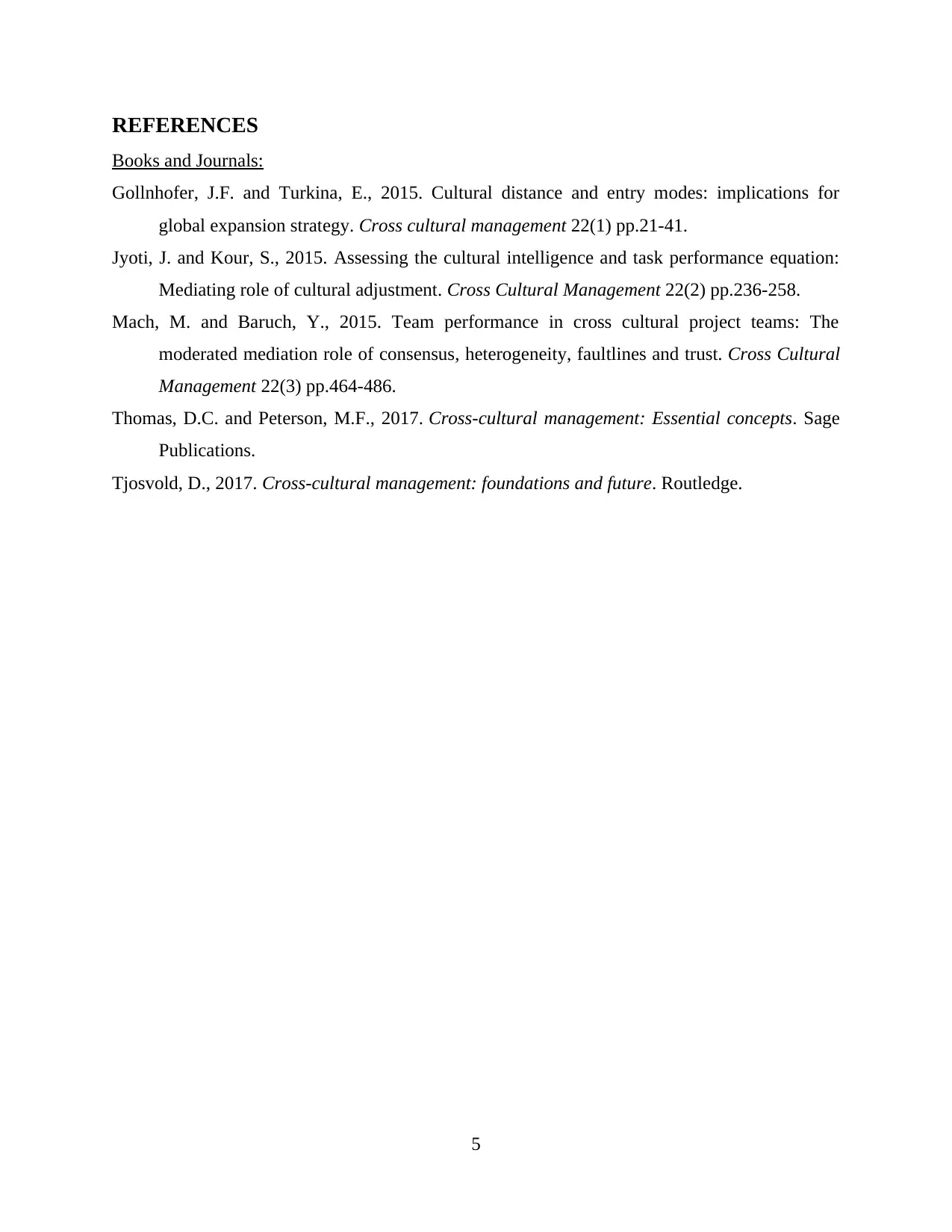
REFERENCES
Books and Journals:
Gollnhofer, J.F. and Turkina, E., 2015. Cultural distance and entry modes: implications for
global expansion strategy. Cross cultural management 22(1) pp.21-41.
Jyoti, J. and Kour, S., 2015. Assessing the cultural intelligence and task performance equation:
Mediating role of cultural adjustment. Cross Cultural Management 22(2) pp.236-258.
Mach, M. and Baruch, Y., 2015. Team performance in cross cultural project teams: The
moderated mediation role of consensus, heterogeneity, faultlines and trust. Cross Cultural
Management 22(3) pp.464-486.
Thomas, D.C. and Peterson, M.F., 2017. Cross-cultural management: Essential concepts. Sage
Publications.
Tjosvold, D., 2017. Cross-cultural management: foundations and future. Routledge.
5
Books and Journals:
Gollnhofer, J.F. and Turkina, E., 2015. Cultural distance and entry modes: implications for
global expansion strategy. Cross cultural management 22(1) pp.21-41.
Jyoti, J. and Kour, S., 2015. Assessing the cultural intelligence and task performance equation:
Mediating role of cultural adjustment. Cross Cultural Management 22(2) pp.236-258.
Mach, M. and Baruch, Y., 2015. Team performance in cross cultural project teams: The
moderated mediation role of consensus, heterogeneity, faultlines and trust. Cross Cultural
Management 22(3) pp.464-486.
Thomas, D.C. and Peterson, M.F., 2017. Cross-cultural management: Essential concepts. Sage
Publications.
Tjosvold, D., 2017. Cross-cultural management: foundations and future. Routledge.
5
1 out of 7
Your All-in-One AI-Powered Toolkit for Academic Success.
+13062052269
info@desklib.com
Available 24*7 on WhatsApp / Email
![[object Object]](/_next/static/media/star-bottom.7253800d.svg)
Unlock your academic potential
Copyright © 2020–2026 A2Z Services. All Rights Reserved. Developed and managed by ZUCOL.
